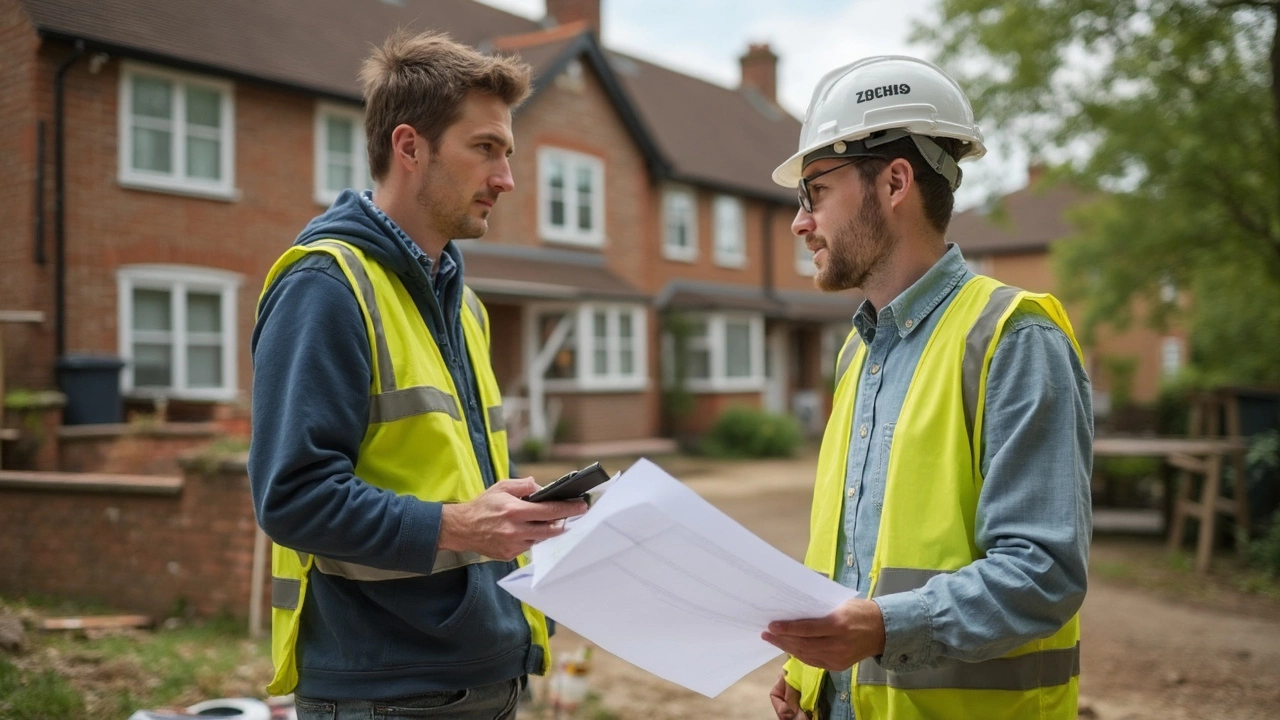Ever tried watching a home renovation show and thought, “How hard can it be?” Turns out, it’s usually a lot harder than it looks. When reality hits—unexpected leaks, sudden budget jumps, permits piling up—most folks don’t want to gamble with their biggest investment. That’s where contractors come in.
Contractors do more than swing hammers and pour concrete. They deal with designs, schedules, building codes, and a whole mess of details you can't see on a blueprint. One survey in 2024 found that over 70% of homeowners hit at least one problem during a DIY project that they didn't know how to handle. Contractors? They build their careers out of solving those kinds of problems every day.
If you’ve ever faced city officials waving red tape or found rotten beams behind your drywall, you know why pros matter. Contractors have the connections—think electricians, plumbers, and carpenters on speed dial. Better yet, they bring the right permits and know exactly which corners not to cut. Messing that up doesn’t just stall a project; it can lead to fines or worse.
- What Is a Contractor, Really?
- The Real Perks of Hiring a Contractor
- Where Contractors Save Your Sanity (and Wallet)
- How to Pick the Right Contractor
- When DIY Isn’t Worth the Trouble
What Is a Contractor, Really?
So, when people say “contractor,” what do they really mean? In the world of construction, a contractor is the person or company you hire to manage your building or remodeling project, big or small. This isn’t just the guy running the nail gun—he’s usually the one organizing every moving part, making sure everything meets local building codes, and handling the official paperwork.
Most contractors fit into two main categories: general contractors and subcontractors. General contractors are like team captains, seeing the whole job through from start to finish. Subcontractors, on the other hand, are brought in for their special skills—think roofing, electrical, or plumbing.
"A good contractor doesn’t just build homes—they solve problems and protect your investment from start to finish." — National Association of Home Builders
Here’s what a building contractor typically handles:
- Pulling the right permits
- Scheduling and overseeing trades (plumbers, electricians, carpenters, etc.)
- Making sure the work follows code and passes inspections
- Ordering materials and managing deliveries
- Solving issues when things go sideways (and they usually do)
Want some numbers? Check out this quick table on what contractors really do on a construction job, based on a 2023 survey by Remodeling Magazine:
| Task | % of Contractors Handling This |
|---|---|
| Project management | 96% |
| Permits and paperwork | 90% |
| Hiring subcontractors | 87% |
| Client communication | 82% |
| Quality control | 88% |
Every contractor will have different specialties, but if you’re hiring them for your next project, you’re usually paying for their know-how, organization, and the peace of mind that comes with having someone else sweat the details.
The Real Perks of Hiring a Contractor
If you want the job done right—and done on time—having a contractor on your side is a game-changer. These folks aren’t guessing; they’ve seen it all before. Here’s what you really get when you bring a professional into your project, whether you’re remodeling a kitchen or building that dream deck out back.
First up: know-how. Contractors don’t just show up with a toolbox. They know building codes, permit rules, and which materials actually last. The National Association of Home Builders found that 83% of homeowners saved weeks—sometimes months—on construction timelines just by hiring an experienced contractor instead of doing it themselves.
You’re also getting a built-in safety net. If something goes sideways, guess who’s on the hook? Not you. Good contractors carry insurance and handle warranty issues, so if a pipe bursts or a wall cracks, you’re not left scrambling or shelling out more cash.
- They manage a whole crew, so you’re not chasing down lost electricians or plumbers.
- They buy materials cheaper, thanks to industry hookups and bulk pricing.
- They schedule inspections so you don’t miss any critical steps.
- Their experience dodges newbie mistakes that blow budgets out of the water.
Let’s look at some real numbers:
| Perk | What Homeowners Save |
|---|---|
| Time | 4-12 weeks on average (per NAHB survey, 2024) |
| Money | 10-18% on materials due to bulk buying power |
| Stress | About 6 out of 10 homeowners said hiring a contractor reduced their stress level a "lot" |
Most important? Relieving yourself of the project headaches. You get someone to steer the ship, handle the surprises, and guarantee the work meets code. That’s why people turn to a building contractor—so they can actually enjoy the finished result without losing sleep along the way.

Where Contractors Save Your Sanity (and Wallet)
Trying to juggle work, family, and a major building project isn’t just stressful—it’s risky for your budget. This is where having a building contractor pays off, big time.
Ever heard of the "hidden cost snowball"? It’s what happens when small mistakes pile up and suddenly blow your budget. Contractors stop that in its tracks. According to HomeAdvisor's 2024 report, homeowners who hired licensed contractors spent an average of 18% less fixing issues than folks who went with the DIY or unlicensed route.
| Who Managed the Project? | Average Cost Overruns | Project Delays (avg. days) |
|---|---|---|
| Licensed Contractor | $2,300 | 12 |
| Homeowner (DIY) | $3,900 | 29 |
| Unlicensed Worker | $4,500 | 34 |
Peace of mind isn’t just a slogan. Contractors deal with the permit headaches, order the right materials, and keep subs on schedule. That means less scrambling for you and way fewer chances of accidents and costly mistakes. Insurance is another biggie. Reliable contractors carry insurance that protects you if a worker gets hurt or if something goes wrong—one less nightmare on your plate.
Let’s talk warranties. When a contractor does the job, you'll often get a warranty for materials and labor. If something breaks or peels six months later, it’s on them to fix—not you. Compare that to fixing a botched DIY project (or paying for mistakes twice), and suddenly that pro looks like a bargain.
- Contractors have supplier connections—better prices and better materials.
- They handle endless paperwork, so you're not stuck at city hall after work.
- Scheduling inspections and coordinating trades? That’s their specialty, not your new weekend hobby.
- Good contractors spot problems before they become disasters.
Most people forget that stress is its own cost. A cluttered project drags out for weeks or months eats into your evenings, your sleep, and sometimes even your relationships. Handing over the headache means you can keep your life on track while your project moves forward, without any "oh no" moments sneaking up on you.
How to Pick the Right Contractor
Finding the right person or crew for your remodel isn’t about picking a name off a Google ad. The wrong contractor can botch a job, vanish after a deposit, or make your life a nightmare with missed deadlines. The right one can make the whole process way smoother. So, here’s how you can size up options, avoid scams, and actually get what you pay for.
First off, always get more than one quote. In the U.S., the average difference between high and low bids for the same project is about 22%—so comparing a few options can save serious money. And don’t just pick the cheapest, either. That lowballer might skip permits or use cut-rate materials.
License and insurance checks aren’t just paperwork. A legit building contractor will have both, and if they don’t, that’s a giant red flag. Uninsured contractors leave you on the hook if someone gets hurt on the job. In most states, you can check contractor licenses online with a state board.
Ask for references and follow up. Actually call at least two or three people the contractor worked for within the past year. You’ll hear the real scoop about delays, surprise costs, or quality worries. If you hear the same complaint twice, it’s probably real.
"The best sign of a trustworthy contractor is a willingness to answer your questions and show you their credentials—no attitude, just facts," says John Levey, Director at the National Association of Home Builders.
Here’s a step-by-step plan that covers the stuff too many folks skip:
- Make a list of three to five possible contractors.
- Verify their licenses and insurance policies.
- Compare written estimates (never settle for a handshake deal).
- Check at least three references, and ask for photos of past jobs.
- Make sure everything you agree on—scope, pricing, timeline—is written into a contract.
If you’re curious what else people mess up during this part, check out these common pitfalls:
- Paying too much upfront. Anything over 10-15% at signing should set off alarms.
- Not reading the small print on the contract. Make sure there’s a clear schedule and payment plan.
- Skipping the permit process. Your contractor should be the one pulling permits, not you.
Want to see how this plays out in real life? Here’s a quick stats table from the Home Improvement Research Institute’s 2024 survey:
| Step Homeowners Skipped | % Who Had Problems |
|---|---|
| No license check | 48% |
| No written contract | 62% |
| No reference follow-up | 55% |
Sticking with the basics—background checks, real contracts, and a little old-fashioned research—keeps most projects on track. Hiring the right pro isn’t just for peace of mind, it’s the best chance you’ve got for getting a job done right, the first time.

When DIY Isn’t Worth the Trouble
Lots of folks jump into DIY with good intentions, only to get smacked with headaches they didn’t see coming. Here’s the truth: some jobs just aren’t worth doing yourself. Anything involving major electrical, plumbing, structural changes, or gas lines should be a hard no unless you’re licensed. One slip can mean a flooded basement, electrical fires, or even your house falling out of code—stuff that gets real expensive real fast.
Let’s talk numbers. According to the Home Improvement Research Institute’s 2024 survey, more than 45% of homeowners who started a large DIY project ended up hiring a contractor to finish things up. And the cost to fix mistakes? These jobs typically ran about 30% higher than if they’d just hired the building contractors from the start.
- Time drain: That weekend project can drag out for months. Contractors work full-time—something most homeowners can’t match.
- Permits and codes: Mess up a permit or inspection, and your work can get shut down. Contractors know which forms and codes matter.
- Tools and skills: Big gear costs a lot to rent, and using it wrong is a safety risk.
- Insurance: If you mess up and someone gets hurt, homeowner’s insurance might not cover it. Contractors carry their own insurance for this very reason.
Check out this quick table showing where DIY goes off the rails for most people:
| Project Type | Common DIY Issues | Average Fix Cost (USD) |
|---|---|---|
| Electrical rewiring | Fire risk, failed inspection | $3,500 |
| Structural wall removal | Building instability | $8,000 |
| Plumbing rework | Leaks, water damage | $2,200 |
| Roof replacement | Leaks, code violations | $4,600 |
If you hit any of these jobs on your to-do list, don’t toss away your savings or roof over a YouTube tutorial. The right contractor takes the guesswork—and the danger—out of the process. Sure, you pay upfront, but you save yourself late-night stress, emergency calls, and thousands in botched repairs down the line.





